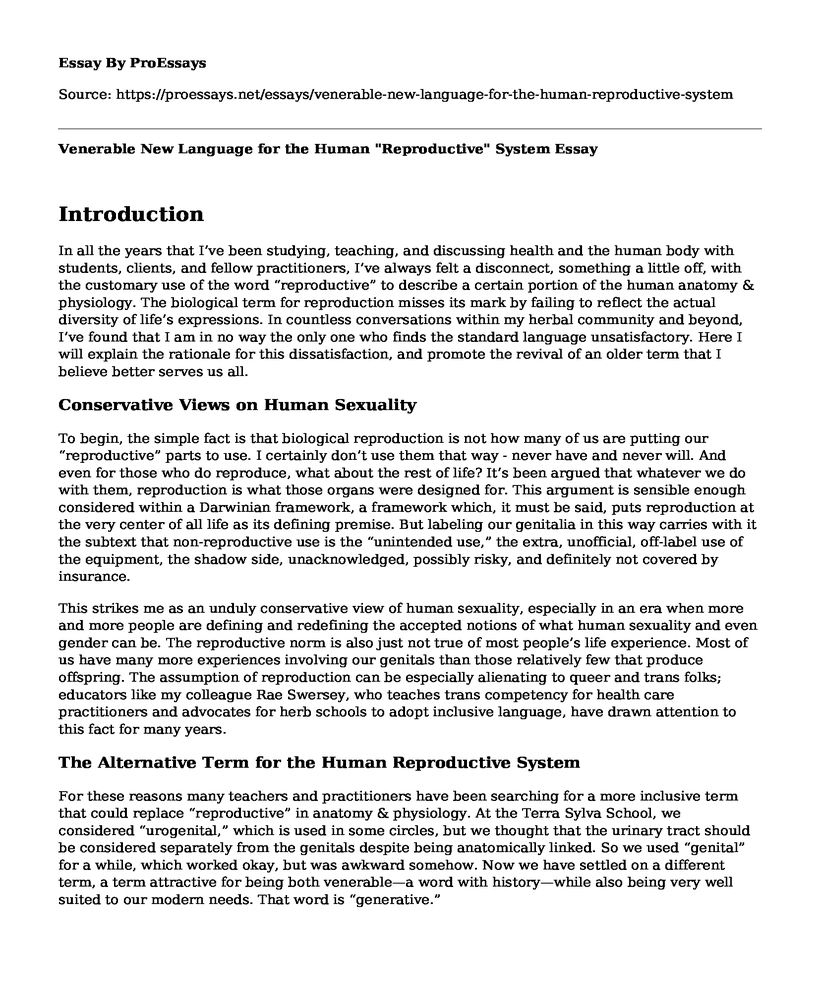Introduction
In all the years that I’ve been studying, teaching, and discussing health and the human body with students, clients, and fellow practitioners, I’ve always felt a disconnect, something a little off, with the customary use of the word “reproductive” to describe a certain portion of the human anatomy & physiology. The biological term for reproduction misses its mark by failing to reflect the actual diversity of life’s expressions. In countless conversations within my herbal community and beyond, I’ve found that I am in no way the only one who finds the standard language unsatisfactory. Here I will explain the rationale for this dissatisfaction, and promote the revival of an older term that I believe better serves us all.
Conservative Views on Human Sexuality
To begin, the simple fact is that biological reproduction is not how many of us are putting our “reproductive” parts to use. I certainly don’t use them that way - never have and never will. And even for those who do reproduce, what about the rest of life? It’s been argued that whatever we do with them, reproduction is what those organs were designed for. This argument is sensible enough considered within a Darwinian framework, a framework which, it must be said, puts reproduction at the very center of all life as its defining premise. But labeling our genitalia in this way carries with it the subtext that non-reproductive use is the “unintended use,” the extra, unofficial, off-label use of the equipment, the shadow side, unacknowledged, possibly risky, and definitely not covered by insurance.
This strikes me as an unduly conservative view of human sexuality, especially in an era when more and more people are defining and redefining the accepted notions of what human sexuality and even gender can be. The reproductive norm is also just not true of most people’s life experience. Most of us have many more experiences involving our genitals than those relatively few that produce offspring. The assumption of reproduction can be especially alienating to queer and trans folks; educators like my colleague Rae Swersey, who teaches trans competency for health care practitioners and advocates for herb schools to adopt inclusive language, have drawn attention to this fact for many years.
The Alternative Term for the Human Reproductive System
For these reasons many teachers and practitioners have been searching for a more inclusive term that could replace “reproductive” in anatomy & physiology. At the Terra Sylva School, we considered “urogenital,” which is used in some circles, but we thought that the urinary tract should be considered separately from the genitals despite being anatomically linked. So we used “genital” for a while, which worked okay, but was awkward somehow. Now we have settled on a different term, a term attractive for being both venerable—a word with history—while also being very well suited to our modern needs. That word is “generative.”
Generative System Definition
The word “generative” includes reproduction in one of its meanings (think of the “generations” on a family tree), but it goes far beyond reproduction, as so much is generated by the generative organs besides offspring—experience, sensation, relationship, initiation, power. In fact some esoteric systems identify the generative organs as the ultimate source of the life force in the body. It is possible to deliberately cultivate generative energy and channel it into physical, spiritual, or magical purposes. These organs are generators, of a special and powerful form of energy, and the word “generative” nicely encompasses all of their possible uses, as well as the reproductive.
Although it apparently fell out of favor in the early 20th century, “generative” was once in common use, interchangeable with “reproductive.” From 1858 we have William Acton’s Practical Treatise on Diseases of the Urinary and Generative Organs in Both Sexes. A book by Emmanuel Swedenborg was translated into English as The Generative Organs Considered Anatomically, Physically, and Philosophically. The term can also be found in herbal classics such as King’s American Dispensatory, Ellingwood’s Eclectic Practice of Medicine, and at least as recently as Sayre’s Materia Medica of 1932.
The first contemporary herb school that I noticed using “generative” in their course curriculum was the Blue Ridge School of Herbal Medicine in Asheville, North Carolina. Feeling an instant affinity for that terminology, and appreciating its precedence, we at Terra Sylva quickly followed suit. Many alternatives to the standard term have been proposed, but they usually suffer from being dryly anatomical and hence reductionist (“gonadal”), or obviously repurposed compromises (like “genital”). “Generative” is elegant, unashamed, positive in its implications, and expressing in its fullness the power and potentials of the human body.
Conclusion
If you haven’t made the switch yet, I strongly encourage you to reconsider your use of the reproduction medical term, and consider embracing this marvelous word “generative,” an antique word whose time has come.
Cite this page
Venerable New Language for the Human "Reproductive" System. (2021, Nov 13). Retrieved from https://proessays.net/essays/venerable-new-language-for-the-human-reproductive-system
If you are the original author of this essay and no longer wish to have it published on the ProEssays website, please click below to request its removal:
- An Analysis of the Indian Health Service Change
- Paper Example on Binomial and Normal Distribution
- Discussion Board: The Dangers of Turning Human Activity into Doses, Abstractions and Useful Tools
- Article Summary: Advanced Practice Nurses (APN) And Policy
- Nursing: Caring for Optimal Health in Society - Essay Sample
- 150 Years of St. Elizabeth Healthcare: A History of Providing Quality Care - Report Sample
- Free Essay Sample on Keys to Nursing Leadership







